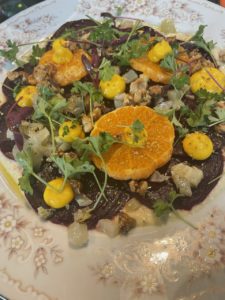Los Angeles Environmentally Sustainable Eats is a rising movement, especially targeted to millennials and generation z who have grown up seeing the spread of environmental catastrophes. Growing up in more extreme seasons than the previous year, visiting more scarcity for agriculture and water has shifted purchasing behaviors. This influences where consumers spend their money to reflect their values. Sustainability is often used in climate change and consumerism. So the term Sustainable Eats has been coined, especially in LA, California for considerate consumers. This shows that society is looking at how to shift from mass waste towards using resources more responsibly. Part of taking care of the earth’s available resources is having governmental, cultural, communal, and individual participation in mindful choices. Sway Features works to correct contaminated soil due to environmental problems by reducing methane and other volatile chemicals leak into breathable air and water.
These mindful choices are nourishing for oneself by choosing to be responsible for how to support methods that reduce one’s carbon footprint. This is done by recycling, driving less, and donating instead of throwing away items by advocating packages in paper or glass instead of plastics and foam. Sustainability looks like a home that recycles or compost or chooses to walk more often. Corporations seem to evolve the production process to minimize pollution, toxins, waste, recycling, and protecting the environment. This awareness has entered the restaurant industry, where consumers support sustainable restaurants. Having options, LA Sustainable Eats has become a consumer conscious choice.
Rise in Los Angeles Environmentally Sustainable Eats
Restaurants that practice sustainability attract mindful consumers, inspire them to these practices, and give back to their community. This holistic behavior benefits patrons, communities, businesses, and the environment. The way that restaurants are sustainable is by keeping food sources local. It is vital to support local farms. This intertwines the benefits and feedback between start to finish for food production. The benefits are apparent; it minimizes pollution and delivers fresher produce or products. Choosing a seasonal menu uses specials to captivate the most nutritional value, freshness, and cheaper costs. Restaurants can partner with farms that practice carbon farming, which focuses on methods that enrich the soil and reduce carbon dioxide. Aka, their objective is to minimize greenhouse gases, the primary factor causing extreme temperatures.

Eateries: Sustainable practices
Another way the food industry can be sustainable is by minimizing waste via compost, food drives, food bank donations, soup kitchens, or discounted resale of unused ingredients. During the pandemic, it was common throughout Los Angeles that eateries couldn’t use up all their delivered ingredients, so they were reselling them. This was an intelligent way to be sustainable. Another way is to make take-out containers durable for reuse, recycling, or return to the establishment. In LA, Sustainable Eats includes using less water, fuel, energy-efficient machines, and keeping vendors local are great ways restaurants can be mindful of the environment. Another way is participating in causes or community events that will bring awareness of sustainable practices or make changes to help restore or protect our environment.
Sustainability – Food impacts every aspect of one’s life

From health to community values. This is seen in community gardens, chicken coop permits, and farmers’ markets. Having restaurants that practice sustainability inspires their patrons to do the practice in their own time. When consumers observe eateries providing seasonal dishes, farm-to-table meals, or small details such as fabric cloth napkins instead of paper napkins, it brings attention that consumers can apply this in their lives.
When restaurants work with the community to donate food to the unhoused or to raise funds for causes that will clean the environment, they are more likely to return to eat there. It’s brilliant for business and brings patrons together on shared values. The importance of being mindful economically, environmentally, and in terms of food, in turn, affects the production and farming of what one eats. This is significant due to its impact on soil, air, and water. Food sustainability matters because what a person eats in a meal has significance to how it is grown and transported. Due to historical oil fields, landfills, or other contaminated soil hazards Sway Features diligently reduces these issues. An example of contaminated soil is the story Hancock Park Elementary School.
Diversity of sustainable eateries
Multiple restaurants and eateries throughout Los Angeles practice sustainability and range among various cuisines. The highlight is Agnes Restaurant and Cheesery and Sage Plant Bistro located in Pasadena. When you walk into these establishments, one notices the details. The attention to a procured menu featuring seasonal dishes, unique flavors, and labels for food allergies. Their tables have fabric cloth napkins and warm, welcoming décor. What is profound about these two places is their devotion to supporting sustainable local businesses and educating customers with their blogs and collaborations. Agnes, for example, works with a company that participates in the “Marin carbon project” and orders with a focus on “sustainably sourced west coast proteins.” In the restaurant, they uphold recycling and donate extra food.

Sage Bistro is a plant-based resultant and a “Zero Waste” restaurant. The bistro makes is a priority to give back to the community. Also, they deliver seasonal dishes to keep one’s diet varied and ripe with nutrition. Achieving the title of “Zero Waste” means that this business diverts at least 90 percent of waste to landfills by redistributing resources. Sage impressively grows their own produce, they have their own farm, “Sow a Heart” . Which is a regenerative agriculture-base farm that houses rescue animals such as goats, dogs, and birds. They also practice sustainability by raising funds for causes such as “Kiss the Ground”. Kiss the Ground is a cause focusing on regenerative agriculture. These are only two restaurants in Pasadena, there is a plethora around Los Angeles and Southern California to explore.
Sustainability directly relates to food intake
This, in turn, reflects consumer values. As noted there is a trend towards compassion for ethical practices has become desired among trends. It’s important to think about how food shapes a person’s life. As well as understand how food intake influences the environment. So as to restore or influence to erode its natural resources and biome. Food can be fuel for one’s health, can encourage immunity, prevent diseases, or can lower one’s health and become illness prone or exposed to toxins and diseases. Food directly impacts the welfare of its consumer. It is why sustainability should be encouraged and easily accessible. How ingredients are raised, grown, transported, prepared, and delivered is significant to how it can be evolved to be sustainable. Hopefully this will inspire one to try eating at a sustainable restaurant or perhaps apply practices.

